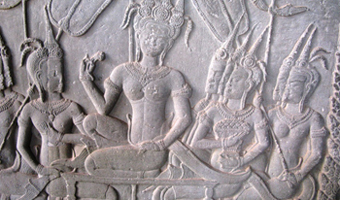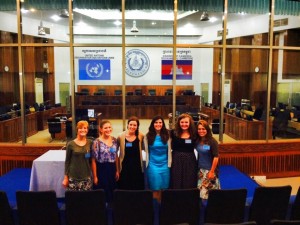Nearly four decades after the Khmer Rouge genocide, two Ohio University faculty and six undergraduate students are headed to Cambodia this summer to study how the society remembers and reconciles its history with its present.
“In the late 1970s, Cambodian society was wracked by the rule of the Khmer Rouge regime, which sought to create a classless society by force. Under this regime, roughly a quarter of the population was systematically killed or died from famine,” says Elizabeth Cychosz, an Honors Tutorial College student majoring in Anthropology and Journalism. “In the years since the genocide, Cambodia has slowly recovered, but sites of significance, such as the Killing Fields at Choeung Ek near Phnom Penh, have been marked by memorials and museums.”
The six students will complete “externships” with a concrete project in cooperation with the Sleuk Rith Institute in Cambodia, an outgrowth of the renowned Documentation Center of Cambodia (DC-Cam) and with Ohio University alum Farina So ’10MA, a Program Director at the Institute. So earned a master’s in Southeast Asian Studies at OHIO. Founded in 1997, DC-Cam has collected and archived the largest compilation of documents related to the Khmer Rouge regime in the world. Its written documents, films, photographs, and other materials have been an incredible resource for researchers, students, and community members. The Sleuk Rith Institute, which will continue to function as a permanent documentation center, will also seek to examine the Khmer Rouge and related issues academically – that is, by offering academic courses of study.
The students have been working since the fall on their research and coursework in preparation for their summer projects in Cambodia. For example, two students with formal training in anthropology and museum studies have identified externship projects relating to genocide memorialization. Th students will present their research proposals on a panel at the upcoming Khmer Studies Forum, which will be held March 14-16 on the OHIO campus.
This collaborative project, titled Imagining International Justice in Post- Genocide Cambodia, has been designed by two faculty members: Dr. Haley Duschinski, Director of the Center for Law, Justice & Culture and a legal anthropologist who specializes in law and conflict, with research and teaching experience in South Asia and Northern Ireland; and Dr. Christine Su, Director of Southeast Asian Studies and a Cambodia area specialist who specializes in race and ethnic relations in Southeast Asia, with extensive research and project experience in Cambodia.
Su has served as a consultant for DC-CAM and Sleuk Rith for the past two years, and recently assisted with the development of a new certificate program in Genocide, Conflict, and Human Rights. Sleuk Rith hopes to implement the certificate in fall 2014 as a pilot, which will be followed by the development master’s and bachelor’s programs. “This is a very important partnership,” says Su. “Cambodia is at a crossroads right now – economically, politically, and socially — and OHIO has the opportunity to be involved in the dialogue about Cambodia’s future with one of its most respected institutions.” The dialogue will take place at Ohio University as well, as six students from Cambodia are currently enrolled in the master’s program in Asian Studies: Southeast Asia, and several more plan to attend in fall 2014.
The new Externship Program is offered by the Center for Law, Justice & Culture, a new and expanding interdisciplinary research and teaching institute committed to the critical analysis of law as it operates in relation to society, culture, politics, and power, in American as well as international contexts. It is part of the new themes curriculum on Making and Breaking the Law in the College of Arts and Sciences. 
In Spring 2014, the students are meeting regularly with Duschinski and Su for structured discussion of ethnographic research techniques, including participant-observation, ethnographic and oral history interviewing, fieldnotes, and qualitative data analysis. Students are also obtaining university approval for the research components of their projects through the Institutional Review Board (IRB) of Ohio University. For the program, students will enroll in an Ohio University course, LJC 3910: Externship in Law, Justice & Culture, for two credit hours during the first summer school session in summer 2014.
“The students as a group have extensive academic training in issues of international justice, law and conflict, and culture and media. Three students are majoring in Anthropology, two are majoring in History, and one is also majoring in Journalism. Two of them are pursuing a Certificate in Museum Studies, and three of them are pursuing a Certificate in Law, Justice & Culture,” Duschinski says.
In Spring 2013, five of the six students participated in Duschinski’s short-term study abroad program on Human Rights, Law, and Justice in Northern Ireland, involving an intensive schedule of interactions with legal scholars, ex-political prisoners, human rights activists, and museum specialists in Belfast and Derry. In Fall 2013, four of them participated in a special honors seminar on Imagining International Justice. Led by Duschinski, this seminar examined how various communities have imagined the meanings, possibilities, and complications of international law and human rights in particular cultural contexts, with special attention to the politics of truth, justice, and reconciliation in democratizing countries.
“We anticipate that this formal collaboration will establish a strong foundation for future student and faculty partnerships and exchanges between the Sleuk Rith Institute, the Center for Law, Justice & Culture, and the Center for International Studies at Ohio University,” Duschinski says.




















Pingback: It’s a Summer Day in Cambodia | Say We Up and Left This Town
Pingback: Introduction | OHIO CLJC Cambodia